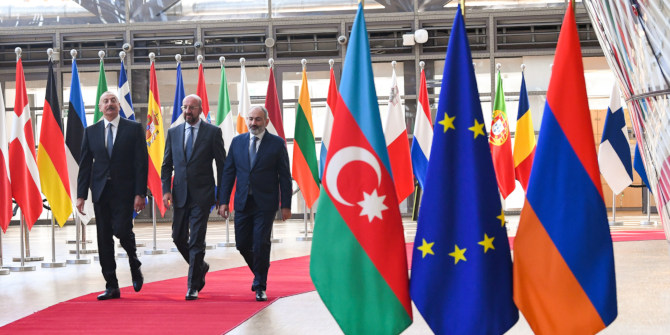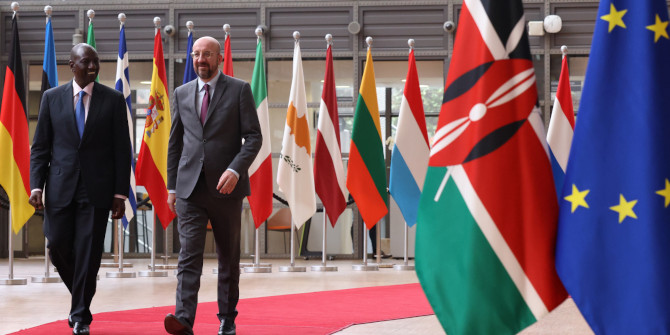 Given the political sensitivity of foreign affairs, the EU’s Common Foreign and Security Policy (CFSP) has generally been understood as one of the most intergovernmental forms of EU decision-making, with national governments maintaining high levels of control over their involvement in joint-actions. As such, it is often assumed that the European Commission plays only a minor role in the decision-making process, but is this actually the case in reality? Based on a recent study, Marianne Riddervold writes that the Commission has exerted a surprising level of influence over CFSP decisions. She argues that in light of these findings it may be necessary to reassess our understanding of how foreign and security policies are determined.
Given the political sensitivity of foreign affairs, the EU’s Common Foreign and Security Policy (CFSP) has generally been understood as one of the most intergovernmental forms of EU decision-making, with national governments maintaining high levels of control over their involvement in joint-actions. As such, it is often assumed that the European Commission plays only a minor role in the decision-making process, but is this actually the case in reality? Based on a recent study, Marianne Riddervold writes that the Commission has exerted a surprising level of influence over CFSP decisions. She argues that in light of these findings it may be necessary to reassess our understanding of how foreign and security policies are determined.
The European Union’s Common Foreign and Security Policy (CFSP) is run by special procedures. The member states have not delegated powers to the supranational institutions. Yet, a number of studies challenge the assumption that policy-making lies exclusively with member states’ governments. The Commission’s putative influence within the CFSP however largely remains to be accounted for. How, if at all, does the Commission exert influence within this formally intergovernmental domain?
In a recent study, I address this issue. I have explored two cases to capture how the Commission influences the CFSP: first, the launch of the EU naval mission EU NAVFOR Somalia (Atalanta); and second, the adoption of an EU Maritime Security Strategy (EUMSS). These cases are representative of what is becoming more and more “typical” in the CFSP, namely that decisions and actions link up to Community policy areas – a trend that is likely to increase with the consistency requirement in the Lisbon treaty. At the same time, not only security and defence but also maritime policies have been jealously protected by the member states, who have been particularly keen to protect their sovereignty in these areas. One would therefore not expect the Commission to have influence beyond its formal competences in these cases.
However, my analysis suggests not only that the Commission was strongly involved in decision-making, but that it also influenced EU policies in both cases. Its influence was the strongest in the maritime security strategy case. The Commission redefined it from a security and defence oriented strategy to a cross-sectoral strategy that also covers a wide number of Community policy-areas falling under Commission competences. In doing so, it could influence its substantial content. The Commission also influenced Atalanta beyond what one would expect in an intergovernmental decision-making process. It did not simply implement the member states’ decisions, but actively cooperated with the French presidency to help make the member states support an autonomous EU mission.
How does the Commission influence EU foreign and security policy?
To tease out how the Commission was able to exert this influence, I isolate three hypotheses drawn from different strands of the EU integration literature. First, the Commission could have used available bargaining tools as leverage to enforce or build member states’ support in favour of its proposals, in line with a rationalist bargaining approach. Second, following a communicative action perspective, the Commission may have sought to present expert-based arguments that if perceived as convincing by at least some member states could have found their way into policy-making outcomes. Third, in line with organisational theory, the Commission could have exerted influence by ‘circumventing’ the formally intergovernmental line of policy-making within the CFSP.
My analysis did not find much support for the bargaining hypothesis in the Atalanta case. Although the member states acknowledge that the Commission has strong bargaining tools when discussing military missions, the Commission did not use these to log-roll or threaten its way into the Atalanta decision-making process or to enforce reluctant member states to support an EU mission. In the maritime security strategy case, however, the Commission vetoed the initiation of the process until it got the European External Action Service’s (EEAS) support for a cross sectoral approach.
The two other hypotheses proved more helpful for explaining the Commission’s influence. Both the organisational structure of the EU and the member states’ request for expert knowledge in interlinked policy-areas are key to understanding the Commission’s influence over policies. The institutional structure of the EU combined with the treaty obligation to coordinate external actions across policy-areas not only creates a demand for services from the Commission, but also allows it to “circumvent” the intergovernmental policy-making procedures that security and defence issues are supposed to follow. And once it had access to the de facto decision-making arenas, it convinced both the EEAS and the different member states of the relevance of its suggestions on the basis of its expertise and competences.
These findings have important implications both for how we theorise the EU in the field of CFSP and for the EU integration literature more generally. They lend support to the claim that the EU does not behave as a classic international organisation in the domain but rather that the CFSP is moving beyond intergovernmental cooperation. Consequently, it suggests that a focus on member state decisions might be too narrow if we want to fully capture who has influence and on what grounds, even in the policy-field most closely associated with state interest, the CFSP. To understand common policies and integrative moves, there is a need for a broader theoretical approach that at least allows for the possibility to study the relevance of alternative hypotheses.
In particular, my research suggests that the Commission’s actions, behaviour and informal interaction with other actors help explain the move towards closer cooperation and integration within the CFSP more generally. More broadly, it illustrates how social factors such as informal cooperation, expertise and the ability to present convincing arguments all are factors that may have integrative consequences even in cases where member states have strong interests.
Please read our comments policy before commenting.
Note: This article gives the views of the author, and not the position of EUROPP – European Politics and Policy, nor of the London School of Economics. Featured image: Handshake between Ahmet Davutoğlu, in the centre, and EEAS head Federica Mogherini, on the right, in the presence of EC Jean-Claude Juncker, on the left; credit: European External Action Service / Flickr (CC-BY-SA-3.0).
Shortened URL for this post: http://bit.ly/1Nrf3NO
_________________________________
 Marianne Riddervold – University of Oslo
Marianne Riddervold – University of Oslo
Dr Marianne Riddervold is a post doctoral fellow at ARENA – Centre for European Studies, University of Oslo. She is currently a visiting scholar at the Institute for European Studies at UC Berkeley.






Without a permanent seat at the UN the EU is in Foreign & Security Limbo. The only member state likely to have a permanent seat at the UN post Brexit will be France & I simply don’t see them handing over the keys to that anytime soon, similarly to back up foreign policy a heavy stick is needed to back up the words, again, Post Brexit that will leave France as the sole provider of hard power & they will not be handing over control of their nuclear weapons & aircraft carriers to the EU & bare in mind they are progressing bilateral deals with the UK & unless France wants to withdraw from a deal with the only other capable global security provider in Europe this technology will not be available to other members of the EU.